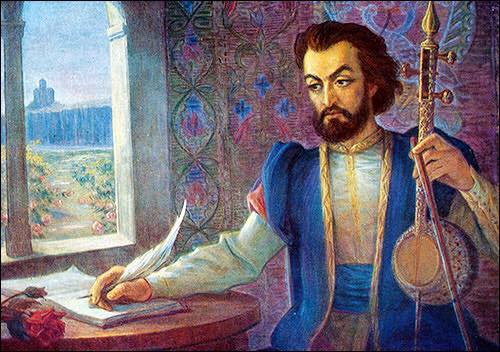The works of Sayat Nova reflect the atmosphere of #learning and a shared #culture of #traditions in an era before the implementation of the rigid nation state.
An ethnic #Armenian born Harutyun Sayatyan and dubbed Sayat Nova ("King of Songs" in #Persian), he was a poet, musician, and ashik (one who sings ghazals - poems sung to the tune of a bağlama, a long-necked lute of sorts).
A testament to the varied skill of an intellectual of his time and environment, Sayat Nova, although most recognised for his poems and singing, performed in the court of King Heraclius II of #Georgia but worked as a diplomat, too. It is said that he aided in the forging of an alliance between Georgia, Armenia, and the region of Shirvan against a Muslim Persian Empire that was encroaching on largely Christian parts of the #Caucasus during the mid-eighteenth century.
Misfortune struck when he fell in love with the king's sister, Ana, and was forced to forfeit his job, spending the rest of his life as a wandering bard, later to be ordained as a priest in the Armenian Apostolic Church.
Confronted by the invading army of Shah Mohammad Khan Qajar, Sayat Nova met his demise at the Haghpat Monastery in Armenia, after refusing to convert to Islam.
His legacy is one that, ideally, transcends geopolitical boundaries, since his culturally-revered works were expressed in Armenian, Georgian, Persian, and #Azeri #Turkish (which is the language of most of his living works). The latter, no doubt, serves as fuel for flame wars in the vile comments sections throughout the net.
Some of his poems even covered all four of these languages, and the bard, fascinatingly, composed his ghazals using Persian and Arabic poetic metre with Armenian melodic structure. The final couplet of his ghazals often speak of Sayat Nova in the third-person, a trademark that reflects the works of Persianate poets like Rumi and Hafez, a style which has continued into the modern era by Turks such as Aşık Veysel and Barış Manço.
One could find his Azeri poems written in a mix of Georgian and Armenian scripts, so it would be unfair to place the poet solely as an Armenian cultural icon instead of the transnational Caucasian bard that he truly was. He lived in a deeply religious society, yet would today find that his works have gained secular and romantic expressionism, much like Rumi who preceded him.
